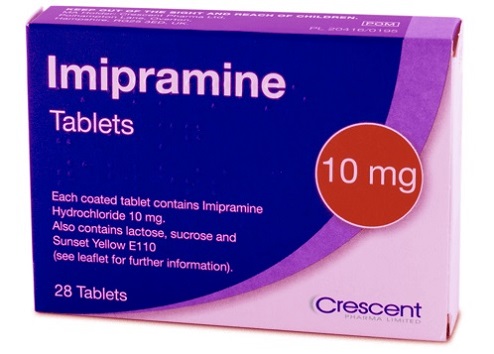Nikhil Prasad Fact checked by:Thailand Medical News Team Mar 12, 2025 1 month, 23 hours, 55 minutes ago
Medical News: Seizures can cause severe damage to the brain, particularly in a region called the hippocampus, which plays a crucial role in memory and learning. A recent study by researchers from Hallym University in South Korea has found that imipramine, a well-known antidepressant, could help protect newborn brain cells from seizure-induced damage. This discovery sheds light on a potential new treatment for individuals suffering from epilepsy or seizure-related brain injuries.
 A New Hope for Brain Cell Survival After Seizures
Understanding the Role of Imipramine
A New Hope for Brain Cell Survival After Seizures
Understanding the Role of Imipramine
Imipramine is an acid sphingomyelinase (ASMase) inhibitor, a type of drug that helps regulate lipid metabolism in brain cells. Lipids are essential for cell survival, but excessive activation of ASMase can lead to neuronal cell death. This
Medical News report highlights that imipramine may help prevent the death of newborn neurons in the hippocampus after seizures, offering new insights into brain protection strategies.
The researchers conducted experiments using a pilocarpine-induced seizure model in rats. Pilocarpine is a chemical that triggers seizures in animals, mimicking the effects of epilepsy in humans. Following seizures, the rats were divided into different groups, with some receiving imipramine treatment while others did not. The study monitored the survival of newborn neurons over four weeks to assess the drug's effectiveness.
Key Findings on Brain Cell Protection
One of the most significant findings of the study was that imipramine treatment increased the survival rate of newborn neurons in the hippocampus. The research team used NeuN staining, a technique that highlights living neurons, to analyze the differences between treated and untreated groups. After one week of treatment, there was no significant difference in neuron survival between the groups. However, after four weeks, the imipramine-treated group showed a remarkable improvement in neuron survival.
-Neuronal survival rates: The imipramine-treated group had 64.9% more NeuN-positive neurons in the CA1 region of the hippocampus compared to the untreated group. Similarly, there was a 37.4% increase in the CA3 region, a 36% increase in the dentate gyrus (DG), and a 34% increase in the subiculum.
-Reduced oxidative stress: The study also measured oxidative stress in the brain, which contributes to neuron damage. Using 4-hydroxy-2-nonenal (4HNE) staining, the researchers found that oxidative stress was significantly lower in the imipramine-treated group, suggesting that the drug helps protect against seizure-induced brain cell damage.
-Impact on brain recovery: The study showed that prolonged imipramine treatment helped restore balance in proteins linked to cell survival, particularly by reducing the pro-apoptotic Bax/Bcl-2 ratio and increasing p-Akt levels. These changes indicate that imipramine may support brain repair mechanisms.
Effects on Newborn Brain Cells and
Neurogenesis
Another crucial aspect of the study was imipramine's effect on the survival of newly generated brain cells. Researchers used 5-bromo-2′-deoxyuridine (BrdU) labeling, a method that tracks the formation of new neurons. The findings showed that while short-term imipramine treatment did not significantly impact new neuron generation, long-term treatment substantially improved their survival.
After four weeks, the imipramine-treated rats displayed a much higher survival rate of BrdU-labeled neurons in the hippocampus compared to the untreated group. The survival ratio of these neurons was 46.3% in the imipramine group, while the untreated group showed only 22.2% survival. These results suggest that imipramine may not only prevent cell death but also support long-term brain repair and neurogenesis.
Implications for Future Treatments
The findings of this study suggest that imipramine could be a promising therapeutic agent for individuals with epilepsy or those who have experienced seizures. Seizures often cause significant neuronal loss, leading to cognitive impairments and long-term neurological deficits. By promoting the survival of newborn neurons, imipramine could help improve brain function and recovery after seizures.
One of the key mechanisms behind imipramine’s effects appears to be its ability to regulate ASMase activity, which in turn affects ceramide metabolism. Ceramides are lipid molecules that play a role in cell death and survival. By inhibiting ASMase, imipramine helps reduce ceramide levels, protecting neurons from damage. Additionally, the drug appears to modulate serotonin and norepinephrine signaling, which are crucial for brain plasticity and recovery.
Conclusion
The study’s results provide strong evidence that prolonged imipramine treatment can significantly enhance neuronal survival after seizures. While short-term effects were minimal, long-term treatment led to a substantial increase in the number of surviving neurons in the hippocampus. The findings also highlight imipramine’s potential to reduce oxidative stress and regulate cell survival proteins, further supporting its neuroprotective role. Future research should explore how these findings translate to human clinical applications, particularly for individuals with epilepsy or other seizure-related conditions.
The study findings were published in the peer-reviewed journal: Cells.
https://www.mdpi.com/2073-4409/14/4/281
For the latest on Brain Health, keep on logging to Thailand
Medical News.
Read Also:
https://www.thailandmedical.news/news/mit-study-explores-40hz-gamma-frequency-for-brain-health
https://www.thailandmedical.news/news/new-study-shows-that-sars-cov-2-infects-the-brain-via-ace2-cd147-and-nrp1-receptors-and-exhibits-neurotoxic-effects
https://www.thailandmedical.news/news/astragalus-mongholicus-efficacy-in-stroke-recovery
https://www.thailandmedical.news/pages/thailand_doctors_listings
